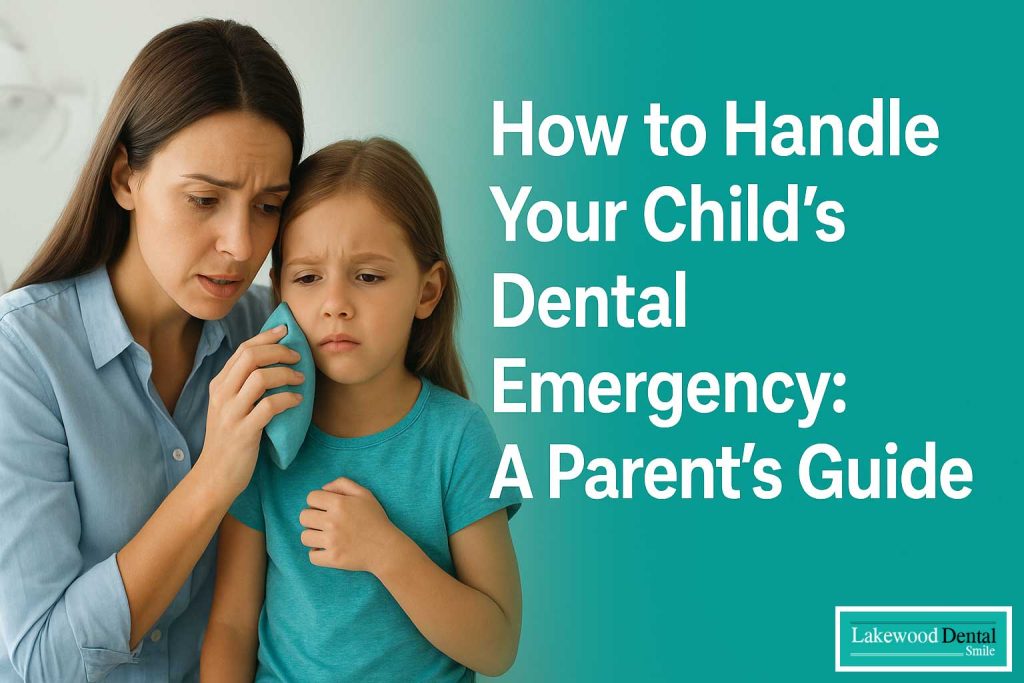
A child dental emergency can happen anytime and anywhere. When it comes to your child, these situations feel especially stressful because handling them differs from other injuries. Knowing what to do in those crucial moments can save your child from losing a permanent tooth. The key to managing a child dental emergency is acting quickly and getting to a nearby dentist as soon as possible. This guide highlights the most common emergencies and how parents can respond effectively until professional care is available.
Children are naturally active and curious, which makes them prone to accidents at home, school, or while playing sports. Toddlers, school-aged children, and teens are especially vulnerable, so knowing how to respond during a child dental emergency is critical.
If Your Child Knocks Out a Tooth
First, ensure your child hasn’t sustained other serious injuries that require immediate medical attention. If the tooth is permanent, keep it moist — ideally in milk, a tooth preservation solution, or inside the cheek if your child is old enough. Very young children should not store teeth in the cheek; use milk or a preservation kit instead. Head to the dental clinic immediately. Baby teeth don’t need to be kept moist but should still be evaluated by a dentist. Permanent teeth are vital for chewing and speech development. Baby teeth usually fall out naturally, but permanent teeth must be preserved carefully to ensure proper alignment and oral health.
⏱ Don’t Delay: Time is critical — the sooner you reach the dentist, the higher the chance of saving the tooth.
If Your Child Cracks a Tooth
If a tooth is cracked, have your child rinse their mouth gently with clean water to remove debris. Apply a cold compress to the outside of the face near the injured area to reduce swelling. Avoid chewing on the injured side until treated. The same first-aid steps — rinsing and cold compress — apply if your child bites their tongue or lip.
Bleeding Gums or Soft Tissue Injuries
If your child’s gums or soft tissues are bleeding, gently rinse the mouth with clean water. Apply gentle pressure with a clean gauze or cloth for several minutes. Use a cold compress on the outside of the mouth to reduce pain and swelling. If bleeding continues beyond 10 minutes, seek emergency dental or medical care.
If Your Child Has a Toothache
Toothaches in children can stem from trapped food particles or dental decay such as cavities, which are common. To relieve discomfort, have your child rinse with warm salt water and apply a cold compress externally. Gently remove lodged food using dental floss or a water flosser — never sharp objects. Persistent pain may indicate an infection or serious dental issue, so schedule an appointment with a children’s dentist as soon as possible.
If Your Child’s Jaw Is Injured
Treatment depends on injury severity. Mild injuries can be managed with over-the-counter pain medication and a cold compress. Severe injuries — difficulty opening or closing the mouth, misaligned bite, or visible fractures — require urgent attention, possibly surgery. Contact your child’s dentist or a hospital emergency department immediately. Even if pain improves, jaw injuries should be professionally evaluated, as fractures may not be obvious.
Precautions to Help Prevent Dental Emergencies
Many dental emergencies can be avoided with simple precautions:
- Encourage your child to wear mouth protection, such as guards or helmets, during sports.
- Supervise young children; discourage running with objects like toothbrushes or pencils.
- Teach caution on stairways and around hazards.
- Schedule regular dental checkups every six months.
- Keep your dentist’s emergency contact saved for quick action.
If you ever face a child dental emergency in Dearborn, Michigan, the team at Lakewood Dental Smile is ready to help. Our experienced dentists provide fast, compassionate, and effective care to protect your child’s smile and oral health.
